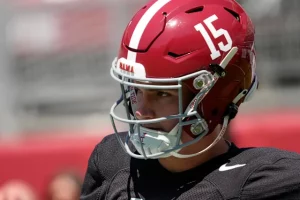
In an era defined by transcendent quarterbacks, where Lamar Jackson redefined mobility and Josh Allen exploded onto the scene with a cannon for an arm, the spotlight now shines on a new heir to the throne — Arch Manning. And this time, the hype isn’t premature. It’s well-earned, deeply rooted, and historically significant.
Arch Manning is not just carrying a famous name. He’s redefining it.
Before a ball was ever thrown, the name “Manning” commanded respect. Arch is the son of Cooper Manning, grandson of Ole Miss legend Archie Manning, and nephew of two Super Bowl-winning quarterbacks, Peyton and Eli. But where lineage may create expectations, Arch is demolishing them with his own brand of brilliance.
Unlike his uncles, who were more cerebral and methodical in approach, Arch plays with a rare blend of intuition, improvisation, and raw athleticism — something closer to Lamar Jackson’s elusiveness and Josh Allen’s unteachable arm strength. But even those comparisons fall short of capturing what Arch brings to the field.
Because, quite frankly, we haven’t seen anything quite like him.
At 6-foot-4, 220 pounds, Arch Manning is already built like an NFL quarterback. What separates him, however, isn’t just his measurables — it’s the way he maximizes them.
Where Josh Allen is a wrecking ball, Arch is a scalpel — slicing up defenses with pinpoint accuracy from any platform. Where Lamar Jackson glides with slippery escapability, Arch combines deceptive speed with poise and control, often extending plays in a way that feels scripted, yet improvisational. It’s not just about scrambling. It’s how he resets his platform and delivers on the move that makes him so dangerous.
His release is lightning quick. His velocity matches NFL starters. And most shockingly, he sees the field with advanced anticipation. For someone who only recently took over as QB1 at Texas, his processing speed is years ahead of schedule.
Critics may argue that Jackson and Allen earned their stripes at the college and pro levels, while Arch is just beginning his journey. But sometimes greatness reveals itself early.
In his spring game performances, closed scrimmages, and select moments as QB2 behind Quinn Ewers, Arch flashed what scouts call “rare traits.” It wasn’t just the jaw-dropping deep throws or the tight-window lasers — it was the calm command of the offense, the way teammates rallied around him, and the subtle pre-snap reads that consistently placed Texas in the right plays.
As a high school senior at Isidore Newman, he accounted for over 8,500 total yards and 115 touchdowns. He was never just a “legacy recruit” — he was the No. 1 overall prospect in the 2023 class for a reason.
Lamar Jackson’s final season at Louisville saw 3,660 passing yards and 27 touchdowns — with another 1,601 yards and 18 scores on the ground. Josh Allen had modest production at Wyoming (1,812 yards, 16 TDs, 6 INTs in his final season). While Arch doesn’t have that body of work yet, the early signs suggest his ceiling could be higher than both. His mechanics are cleaner than Jackson’s at the same stage, and his touch is already more refined than Allen’s during his college career.
Where Arch begins to truly separate himself is in the film room and at the line of scrimmage. Peyton and Eli were savants — but Arch is their evolution. He blends the IQ of a traditional pocket passer with the adaptability of a modern dual-threat star.
One Texas assistant described him as “already reading coverages like a fourth-year starter.” Another marveled that “he changed a protection on a blitz we hadn’t even installed yet. He just knew it was coming.”
This is the Manning family code: obsessive preparation, stoic leadership, and cerebral command. But unlike his uncles, Arch has the athletic traits to go off-script, to turn broken plays into 60-yard highlights. The result? A quarterback who combines mental mastery with physical chaos — and wins.
Teammates don’t just follow Arch Manning — they believe in him. He doesn’t act entitled. He doesn’t carry himself like someone born into greatness. He earns his respect, every day, with consistency, humility, and a competitive fire that mirrors the best quarterbacks in football.
As soon as he arrived in Austin, Arch went to work — in the film room, in the weight room, and on the practice field. He didn’t come to Texas to wait; he came to dominate.
Now that Quinn Ewers has declared for the NFL Draft, the Longhorns are officially Arch’s team. And if you ask anyone inside the program, they’ll tell you he’s not just ready — he’s built for this.
Texas head coach Steve Sarkisian has crafted a quarterback-friendly offense — one that helped Mac Jones lead Alabama to a national title and rejuvenated Quinn Ewers’ career. With Sark drawing up the plays and Arch executing them, the potential is limitless.
The scheme emphasizes motion, misdirection, and vertical concepts that perfectly suit Arch’s arm talent and processing ability. Even better, Texas is stacked with offensive weapons — a deep WR corps, elite RBs, and one of the nation’s best offensive lines. That gives Arch the environment every young QB dreams of.
But it’s not just about system or surroundings. It’s about what he does with it. And Arch Manning is on track to take Sark’s offense to heights it hasn’t seen — not even during the Vince Young era.
Playing quarterback at Texas is pressure enough. Add the Manning name, and it becomes a crucible. Yet Arch never flinches.
He is eerily calm. He doesn’t force throws. He doesn’t lose his cool. He’s methodical, calculating, and above all — unafraid. His ability to play within himself while still delivering explosive plays is what sets him apart.
Scouts say he “plays like he’s already in the NFL.” Others say he reminds them of a young Andrew Luck — but with more mobility. It’s easy to compare, but harder to define. Because what Arch Manning represents might be an entirely new quarterback prototype: the ultimate hybrid.
Perhaps the most underrated part of Arch Manning’s arrival is what it has done for Texas as a program.
His commitment sent shockwaves through college football. Blue-chip recruits followed. The Longhorns’ 2023 and 2024 classes surged. Suddenly, Texas wasn’t just “back” — it was a destination again.
Arch could’ve chosen Alabama, Georgia, or anywhere in the country. But he chose Texas — not for comfort, but for challenge. And that decision, rooted in loyalty and belief, has inspired an entire program to raise its standards.
The Manning Effect is real. And it’s just beginning.
It’s still early. Arch Manning has yet to start a full season. But the glimpses we’ve seen? They’re terrifying — at least if you’re a defensive coordinator.
Whether it’s throwing a 40-yard rope across his body while sprinting left, or checking into a blitz-beating screen on third-and-long, Arch doesn’t play like a freshman. He plays like the future.
He’s not just a better athlete than Peyton. Not just a smarter passer than Lamar at this age. Not just a more polished product than Allen ever was in college.
He’s all of it — and then some.
The expectations will be immense. Every throw will be dissected. Every decision questioned. But if there’s one quarterback built to carry the weight of history and modern football’s demands, it’s Arch Manning.
He’s not just the next great Manning.
He’s something we’ve never seen before.
He’s the prototype for the next generation of quarterbacks — smarter than the system, faster than the rush, and tougher than the pressure.
So when you watch Arch Manning take the field this fall in burnt orange, remember: you’re not just watching another college quarterback.
You’re watching the evolution of the position.
And when the history books are written, Lamar Jackson and Josh Allen may still be legends — but Arch Manning might just be the standard.





